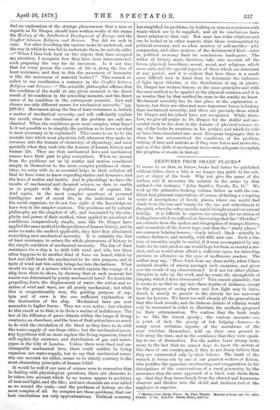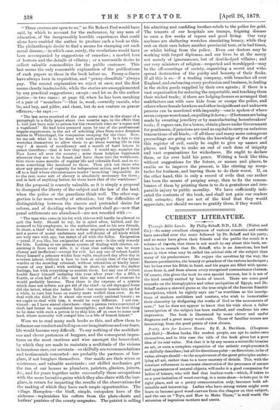SKETCHES FROM SHADY PLACES.* Fr seems to us that, in
future, books had better be published without titles, since a title is no longer any guide to the sub- ject or object of the book. "Why not give the name of the author, and if necessary the number in the series by that author ?—for instance, " John Smith's Novels, No. 10." We took up the attractive-looking volume before us with the con- fident and pleasant expectation, of course, of finding a tempting series of descriptions of lovely places, where one might find shade from the sun and beauty for the eye and refreshment to the spirit, when the sultry months again brought round our annual holiday. It is difficult to express too strongly the revulsion of feeling from which we suffered on discovering that the " Sketches" are extracts from the spoken autobiographies of tramps, thieves, and scoundrels of the lowest type, and that the " shady places " are common lodging-houses,—shady indeed—black—actually in sunless darkness, and morally, with filth and vice. Such a his- tory of rascality might be useful, if it were accompanied by any hints for its cure, such as one would hope for from so careful a stu- dent, and as would alone afford a sufficient cause for intruding pictures so offensive on the eyes of inoffensive readers. The author may say, " Have I not done my share nobly, when I have endured months of misery amongst such creatures, and given you the result of my observations ? Is it not for other philan- thropists to take up the work, and lay waste the strongholds of iniquity which I have discovered ?" This sounds plausible; but it seems to us that to spy into these depths of darkness, except for the purpose of seeing where and how light may be intro- duced, is merely to pander to the already far too universal taste for horrors. We know too well already all the general facts that this book reveals, and the hideous details of villainy would only be warranted in order to illustrate the methods proposed for their extermination. We confess that the book reads to us like the lowest gossip ; the various accounts are, in point of fact, the gossip of low lodging - houses,—in many cases verbatim reports of the narrations of the poor wretches themselves, told on their own ground to wile away the time, and in the confidence that they were speak- ing to one of themselves. For the author bears strong testi- mony to the fact that we cannot hope to know the secrets of this class of our countrymen, if they do not firmly believe that they are surrounded only by their fellows. The truth of the remark is borne out by one of our greatest writers of fiction, who justifies the apparent overdrawing and exaggeration in his descriptions of the conversations of a rural peasantry, by the assurance that the mere approach of a black coat shuts them up—that they drop immediately from the shrewd and humorous observer and thinker into the stolid and taciturn tool of the employer or superior.
• Sketches from Shads Places. By Thor Fredur. Iteprinud from the PM ,Mall Gazelle. 1 vol. London: Smith, Elder, and Co.
" Three courses are open to us," as Sir Robert Peel would have said, by which to account for the endurance, by any man of education, of the inexpressibly horrible experiences that could alone have enabled the author to produce such a book as this. The philanthropic desire to find a means for stamping out such moral disease,—in which case, surely, the revelations would have been accompanied by suggestions of remedies ; a morbid love of horrors and the details of villainy ; or a mercantile desire to collect saleable commodities for the public customer. This last seems the only reasonable explanation of the publications of such papers as those in the book before us. Penny-a-liners have always been in requisition, and " penny-dreadfuls " always pay. The second explanation we reject at once, and the first seems clearly inadmissible, while the stories are unsupplemented by any practical suggestions ; except—and let us do the author justice—in two cases ; at page 82, when he has been speaking of a pair of " mouchers "—that is, weak, cowardly rascals, who lie, and beg, and pilfer, and cheat, but do not venture on graver offences,—he says :—
" The last news received of the pair came to me in the shape of a paragraph in a daily paper about two months ago, to the effect that L. had just been sent to prison for the twentieth time as a rogue and a vagabond.' He had been pounced upon by one of the professional beggar-suppressors, in the act of soliciting alms from some drunken Bailors in Whitechapel, his companion escaping for the time. Now, let me ask what is to be done with such people ? Is it fair to the wretches themselves to allow them to go about wasting life in this way ? A month of mendicancy and a month of hard labour in prison therefore,—that is how they exist. I would say, equalise the Poor Laws all over the country ; seize these helpless vagabonds wherever they are to be found, and force them into the workhouse. Give them some months of regular life and tolerable food, and so re- store something like manhood to them. Then pick out those who show any promise of capacity for independent action, and pack them off to a land where circumstances render `mooching' impossible. As to the rest, some sort of slavery is absolutely necessary for them ; and in lack of anything better, let them have that of the workhouse."
But the proposal is scarcely valuable, as it is simply a proposal to disregard the liberty of the subject and the law of the land, when the police or the guardians think well. The other sug- gestion is far more worthy of attention; but the difficulties of distinguishing between the sincere and pretended desire for reform, and of deciding where the penitent shall go—now that penal settlements are abandoned—are not wrestled with
The man who casts in his lot with thieves will hardly be allowed to quit the body. Should he try, he is spied after, bullied, and de- nounced to his employers, to the authorities, and to his new friends. In short, a thief who desires to reform requires a strength of mind and a power of moral endurance and self-denial of all kinds which are very rare with any, but rarest of all with the fallen. Emigration —penal, if you like, but emigration of some sort—is the only remedy for him. Looking at our present system of dealing with thieves, ex- amining it from every side, it is clear that nothing can be more clumsy and inefficient—except for evil. Let any one of robust health fancy himself a prisoner within four walls, employed day after day in severest labour, without a face to look at except that of the tyrant warder or the scowling criminal, without relaxation or kindly inter- course of any kind ; with nothing, in short, to subdue the darker feelings, but with everything to nourish them. Let any one of robust health fancy himself enduring this year after year—for a fifth, a fourth, or even half of a life—and then say what sort of creature he would probably become. Then there is the expense of a system which does not reform nor get rid of the thief—in old days gaol fever did the latter, when the halter failed—but merely hoards him up for a while, to tarn him loose on society more wolfish than ever. As we deal with the thief, he is about our most costly national luxury ; as we ought to deal with him, it would be very different. I am con- vinced—as I have stated elsewhere—that a person twice convicted of theft had better be considered incorrigible ; and that the best thing to be done with such a person is to ship him off at once to some new land, where necessity will compel him to a life of honest labour."
Were we to read many such books as this, and allow them to influence our conduct and tell upon our imaginations and our fears, life would become very difficult. To say nothing of the multifari- ous and clever pretences of beggars, and the consequent impos- tures on the most cautions and wise amongst the benevolent, by which they are made to maintain a multitude of the vicious in luxurious ease, our servants—so skilfully are recommendations and testimonials concocted—are probably the partners of bur- glars, if not burglars themselves. Our maids are their wives or mistresses, and valuable assistants ; our skilled mechanics get the run of our houses as plumbers, painters, glaziers, joiners, &c., and for years together unite successfully these occupations with the more lucrative gains which they also share with the bur- glars, in return for imparting the results of the observations for the making of which they have such ample opportunities. The village Hampden—the bluff, simple, outspoken hero of the alehouse—replenishes his coffers from the plate-chests and butlers' pantries of the county magnates. The patriot is selling
his admiring and confiding brother-rebels to the police for gold. The tenants of our hospitals are tramps, feigning disease to earn a few weeks of repose and good living. Our very asylums are sheltering wretches simulating lunacy, while they rest on their oars before another provincial tour, or in bad times, or whilst hiding from the police. Even our doctors may be working with forged diplomas, and our lives be at the mercy not merely of ignoramuses, but of double-dyed villains; and our very ministers of religion—respected and worshipped—may be the off-scourings of society, organising a secret and wide- spread destruction of the purity and honesty of their flocks. If all this is so,—if a trading company, with branches all over England, and embracing every profession and business, is dealing in the stolen goods supplied by their own agents ; if there is a vast organisation for seducing the respectable, and teaching them their wicked trade ; if there are lodging-houses so arranged that malefactors can with ease hide from or escape the police, and others where female hawkers and other insignificant and unknown persons can be murdered with impunity—one is spoken of where seven corpses were found, on pulling it down;—if fortunes are being made by sweating jewellery or by manufacturing housebreakers' tools ; if rogues can, for a bonus, obtain places under Government for gentlemen; if pensions are used as capital to carry on nefarious transactions of all kinds,—if all these and many more outrageous proceedings are going on within the knowledge of the author of this register of evil, surely he ought to give up names and places, and begin to make an end of such dens of iniquity and vast organisations for wickedness. He ought to declare them, or for ever hold his peace. Writing a book like this, without suggestions for the future, or names and places, to enable us to improve the present, is like stirring up recep- tacles for foulness, and leaving them to do their worst. If, on the other hand, this is only -a record of evils that our author has been the means of purging away, then to fix the remem- brance of them by printing them is to do a gratuitous and irre- parable injury to public morality. We have sufficiently indi- cated the contents of the book, and shall not pain our readers with extracts ; they are not of the kind that they would appreciate, nor should we care to gratify them, if they would.



































 Previous page
Previous page